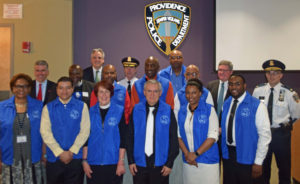
by Dave Seifert
Nearly three years of community work culminated May 2, when the first-ever Rhode Island Community Chaplain Corps (CCC) graduated from initial training, ready to begin work.
In 2015 and 2016, a team of top law enforcement officials and a multiracial group of pastors and ministers planned and hosted a series of training classes in faith centers around Providence to build trust and communication across any divides, and to train faith leaders to be ambassadors for their faith groups and surrounding community.
The Rev. Dr. Joyce Penfield, priest-in-charge at St. Peter’s and St. Andrew’s, Providence, is the group’s convener. She initiated the work that led to this pilot after the 2014 unrest in Ferguson, Missouri. Her goal has been to bring together Providence residents, and faith-based and community leaders to identify ways to enhance communications and prevent similar problems in Providence.
“We are building something in Providence together across racial and ethnic lines: faith leaders, cops, law enforcement officials, and families,” Penfield said. “The graduation was actually a time for us to celebrate our new friendships and commitment of community chaplains to be a prayerful, nonviolent presence in our neighborhoods in times of crisis or stress.”
Each member of the multiracial team of about a dozen pastors and faith leaders received an identification card and a CCC vest at the ceremony to further identify them as official resources. The Rt. Rev. W. Nicholas Knisely, bishop of Rhode Island, blessed the graduates.
“I am proud of the work Joyce has led to help the Providence community,” Knisely said. “The police have indicated interest in working with communities of faith, and I have encouraged Episcopalians around the state to reach out. Joyce has been an early leader in that kind of effort.”
Each CCC graduate participated in three intensive training sessions and a ride-along with the police department. Their role is to be a calm, neutral buffer and nonviolent support for the community. The project will be evaluated at the end of 2017 with the hope of offering suggestions for improvement and expansion to others in the community.
Read more about the evolution of this pilot program in the 2017 issue of RISEN, the magazine of the Episcopal Diocese of Rhode Island.
